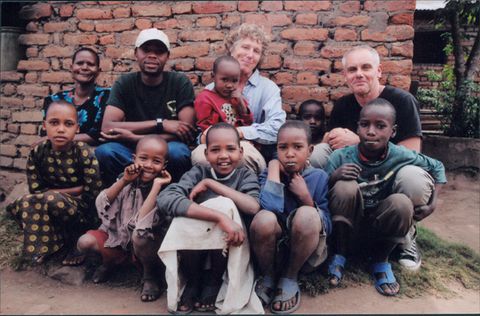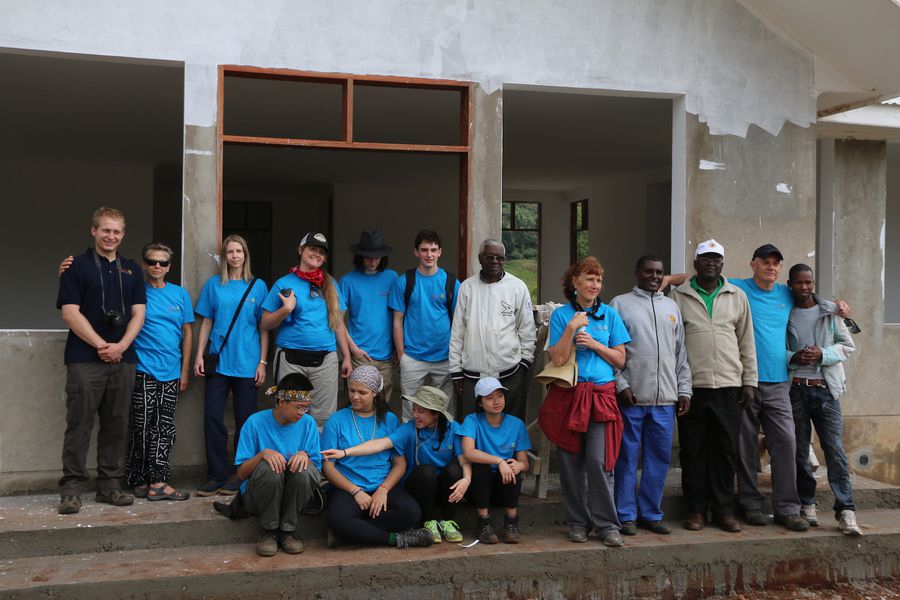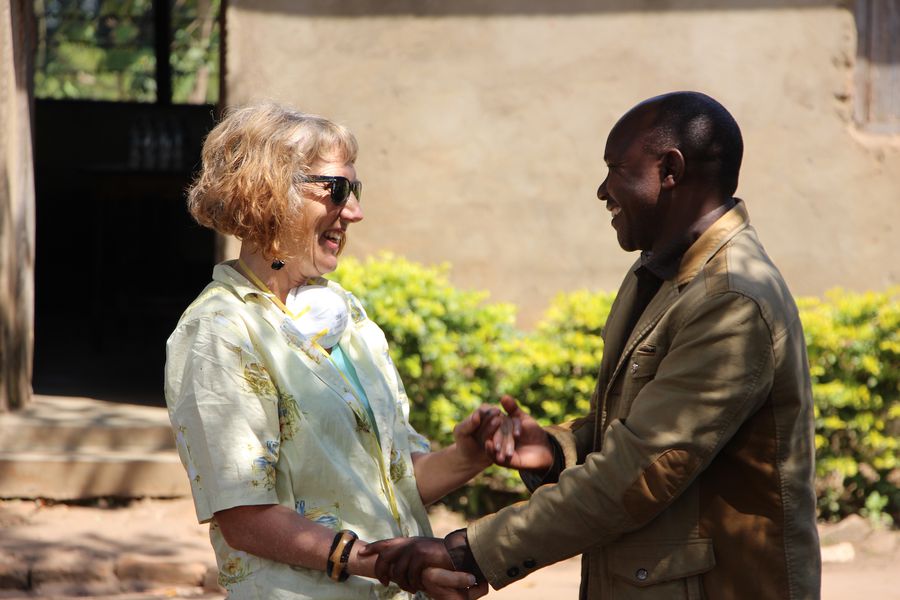
history
History
Karimu is a small nonprofit organization that seeks to run as efficiently as possible. Therefore, outside of Tanzania, Karimu is staffed exclusively by volunteers. They work at a high level of professionalism to manage all aspects of fundraising, operations, strategy, program development, and in partnership with the Tanzanian staff, project execution.
Felt obligated to return
Three-time volunteer Peggy Seltz’s award-winning film, Until We Meet Again: Building a School in Tanzania, details Karimu’s early days. Here is the entire video.
Karimu founders Don Stoll and Marianne Kent-Stoll first visited Dareda Kati in 2007 as tourists, curious about life in an African village. They had been brought there by an energetic and enterprising coffee taster and exporter named Joas Kahembe, who had founded one of the first companies to introduce cultural tourism to East Africa.
Don and Marianne had no idea that they would be welcomed by the whole community and invited to return. Shocked by some of the challenges facing the villagers—for example, Ufani Primary School’s 230 students had just two usable classrooms—they felt obligated to return.

Threaten to close school
Because a shallow hole in the ground was serving as the only toilet for Ufani’s entire student body, the Tanzanian government had threatened to close the school. Don and Marianne donated $500 to finish the construction of half a dozen toilets for which the villagers had run out of funds, and the school stayed open.
Meaning of Karimu
Back in California, Don and Marianne founded the nonprofit Karimu International Help Foundation in 2008. The Swahili word karimu, meaning “generous” and “welcoming,” aptly describes Dareda’s people.
Don and Marianne thought it was important for people besides themselves to experience what they had, so Karimu’s annual trips have always included volunteers—as few as 15 and as many as 35.
These volunteers work hard during their 12 or 13 days in the village, but the great bulk of the managerial and physical work on Karimu’s projects is executed by year-round Tanzanian residents to whom Karimu pays salaries or hourly wages. Their original host in Dareda Kati, Kahembe, was consistently the most crucial Tanzanian contributor to Karimu’s work, overseeing the efficient execution of one project after another.

Acutely conscious of the fact that Tanzania is as protective of its sovereignty as any other nation, Kahembe was also valuable in another respect. Working effectively in a foreign country requires cooperation with local and regional governments. Kahembe introduced Don and Marianne to many government officials and encouraged Karimu’s founders to cultivate them as contacts.
First major goal
Renovating and expanding Ufani Primary School was Karimu’s first major goal. But Don and Marianne were gradually made aware of the entire administrative area of Ayalagaya Ward, of its handful of other schools, and of the other problems that would need to be solved if school renovations were to produce a lasting positive impact.
Together with the villagers
Karimu seeks solutions to the manifold interconnected problems of the poor. That awareness came in the beginning, as it continues to do so today, from the villagers themselves. Karimu’s first principle has always been to listen to the villagers.
For example, it was the villagers who pointed out that even the brightest and most ambitious students would benefit little from school improvements if they were too sick to go to school or if their parents were too sick to work and therefore needed their children’s labor on the farm. Therefore Karimu became involved in expanding access to clean water and in health care improvements.
And it was the villagers who pointed out that good schools would remain half-empty during the long rainy season if a flooded river prevented many children from crossing in order to get to school. Therefore Karimu partnered with another NGO (Bridging the Gap Africa) to build a safe walking bridge.
In short, growing familiarity with the manifold interconnected problems of the poor, as carefully explained by the villagers, gradually led Karimu to a holistic view of the challenges faced by Ayalagaya Ward. With the support of the villagers, Karimu continues today to take that holistic view of challenges and of the imperative to overcome challenges.

Development model
As Karimu looks to the future, we are honored that others want to duplicate our development model of trust, listening, and humility. David Newman and his wife, Linda Ogren, founders of The Rafiki Village Project, a nonprofit working 30 miles from Dareda Kati, volunteered with Karimu in 2018 so that they could shadow our work. We hope to develop similar relationships with other small nonprofits so that the Karimu model for poverty elimination can have a greater impact.
Thanks to the addition of Nelson Mattos as Chief Operating Officer, along with his wife, Claudia, and their enthusiastic friends, Karimu can raise more funds, work more strategically, hire more locals on the ground, and exert a bigger impact in Dareda Kati and elsewhere. No matter how big Karimu grows, however, we will remember that our work began with the simple acts of making friends and fixing a toilet. We intend to continue to do small things with meticulous care.
The Karimu founders and its COO finalized in March 2018 a 5-year strategic plan after meeting with several leaders and representatives of the Ayalagaya Ward villages. A solid agreement from all parties was reached. The plan defines Karimu´s priorities for the next years, an exit strategy, and the expansion to new Wards, such as Arri, which is 2.5 times bigger than the Ward of Ayalagaya. In 2021 another strategic plan was created in Arri Ward for poverty elimination. Now that projects are near completion in Ayalagaya, Karimu is turning its focus towards Arri, where in 2022, a major water supply that serves twenty-five thousand people was completed.
Since April 2018, Karimu is also registered as a non-profit organization (Karimu Heart and Spirit Organization - KAHESO) in Tanzania.
History
Karimu is a small nonprofit organization that seeks to run as efficiently as possible. Therefore, outside of Tanzania, Karimu is staffed exclusively by volunteers. They work at a high level of professionalism to manage all aspects of fundraising, operations, strategy, program development, and in partnership with the Tanzanian staff, project execution.
Felt obligated to return
Three-time volunteer Peggy Seltz’s award-winning film, Until We Meet Again: Building a School in Tanzania, details Karimu’s early days. Here is the entire video.
Karimu founders Don Stoll and Marianne Kent-Stoll first visited Dareda Kati in 2007 as tourists, curious about life in an African village. They had been brought there by an energetic and enterprising coffee taster and exporter named Joas Kahembe, who had founded one of the first companies to introduce cultural tourism to East Africa.
Don and Marianne had no idea that they would be welcomed by the whole community and invited to return. Shocked by some of the challenges facing the villagers—for example, Ufani Primary School’s 230 students had just two usable classrooms—they felt obligated to return.

Threaten to close school
Because a shallow hole in the ground was serving as the only toilet for Ufani’s entire student body, the Tanzanian government had threatened to close the school. Don and Marianne donated $500 to finish the construction of half a dozen toilets for which the villagers had run out of funds, and the school stayed open.
Meaning of Karimu
Back in California, Don and Marianne founded the nonprofit Karimu International Help Foundation in 2008. The Swahili word karimu, meaning “generous” and “welcoming,” aptly describes Dareda’s people.
Don and Marianne thought it was important for people besides themselves to experience what they had, so Karimu’s annual trips have always included volunteers—as few as 15 and as many as 35.
These volunteers work hard during their 12 or 13 days in the village, but the great bulk of the managerial and physical work on Karimu’s projects is executed by year-round Tanzanian residents to whom Karimu pays salaries or hourly wages. Their original host in Dareda Kati, Kahembe, was consistently the most crucial Tanzanian contributor to Karimu’s work, overseeing the efficient execution of one project after another.

Acutely conscious of the fact that Tanzania is as protective of its sovereignty as any other nation, Kahembe was also valuable in another respect. Working effectively in a foreign country requires cooperation with local and regional governments. Kahembe introduced Don and Marianne to many government officials and encouraged Karimu’s founders to cultivate them as contacts.
First major goal
Renovating and expanding Ufani Primary School was Karimu’s first major goal. But Don and Marianne were gradually made aware of the entire administrative area of Ayalagaya Ward, of its handful of other schools, and of the other problems that would need to be solved if school renovations were to produce a lasting positive impact.
Together with the villagers
Karimu seeks solutions to the manifold interconnected problems of the poor. That awareness came in the beginning, as it continues to do so today, from the villagers themselves. Karimu’s first principle has always been to listen to the villagers.
For example, it was the villagers who pointed out that even the brightest and most ambitious students would benefit little from school improvements if they were too sick to go to school or if their parents were too sick to work and therefore needed their children’s labor on the farm. Therefore Karimu became involved in expanding access to clean water and in health care improvements.
And it was the villagers who pointed out that good schools would remain half-empty during the long rainy season if a flooded river prevented many children from crossing in order to get to school. Therefore Karimu partnered with another NGO (Bridging the Gap Africa) to build a safe walking bridge.
In short, growing familiarity with the manifold interconnected problems of the poor, as carefully explained by the villagers, gradually led Karimu to a holistic view of the challenges faced by Ayalagaya Ward. With the support of the villagers, Karimu continues today to take that holistic view of challenges and of the imperative to overcome challenges.

Development model
As Karimu looks to the future, we are honored that others want to duplicate our development model of trust, listening, and humility. David Newman and his wife, Linda Ogren, founders of The Rafiki Village Project, a nonprofit working 30 miles from Dareda Kati, volunteered with Karimu in 2018 so that they could shadow our work. We hope to develop similar relationships with other small nonprofits so that the Karimu model for poverty elimination can have a greater impact.
Thanks to the addition of Nelson Mattos as Chief Operating Officer, along with his wife, Claudia, and their enthusiastic friends, Karimu can raise more funds, work more strategically, hire more locals on the ground, and exert a bigger impact in Dareda Kati and elsewhere. No matter how big Karimu grows, however, we will remember that our work began with the simple acts of making friends and fixing a toilet. We intend to continue to do small things with meticulous care.
The Karimu founders and its COO finalized in March 2018 a 5-year strategic plan after meeting with several leaders and representatives of the Ayalagaya Ward villages. A solid agreement from all parties was reached. The plan defines Karimu´s priorities for the next years, an exit strategy, and the expansion to new Wards, such as Arri, which is 2.5 times bigger than the Ward of Ayalagaya. In 2021 another strategic plan was created in Arri Ward for poverty elimination. Now that projects are near completion in Ayalagaya, Karimu is turning its focus towards Arri, where in 2022, a major water supply that serves twenty-five thousand people was completed.
Since April 2018, Karimu is also registered as a non-profit organization (Karimu Heart and Spirit Organization - KAHESO) in Tanzania.


